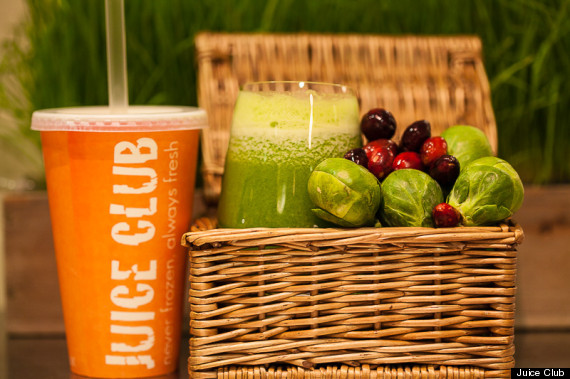Now that we’ve moved past our formative experience of farty-smelling school dinner sprouts, we love the little green things doused in gravy, sitting on our Christmas plate.
But even for HuffPost UK Lifestyle, who regularly indulge in nutritional-friendly but seriously visually-challenging lunches in the office, the idea of brussel sprout juice makes our knees wibble in fear.
To keep in line with the rest of the festive food and drink that emerges this time of year, the Juice Club have started offering the drink – called Fresh juice - in Fortnum and Mason’s in London.

However, getting people to drink brussel sprout juice will be a challenge – judging by a straw poll of disgusted-looking faces in the office when we announced we’d be getting a sample.
We asked Dan Thomson, founder of the Juice Club about the benefits, and he said: “Brussel sprouts are famously nutritious, they are a great source of vitamins A, B6, C, E, and K, as well as potassium, manganese, folate acid, iron, riboflavin and thiamin.
"Most of which contribute to the wellbeing of your skin and hair, and most importantly decrease the free radicals in your body which significantly reduced the risk of cancer.”
The benefits of brussel sprouts as a juice means that like other vegetables, the nutrients and vitamins aren’t lost in cooking.
Plus, Dan assures us, it won’t taste disgusting. “Most raw vegetables are a lot sweeter than most of us imagine,” he adds. “The natural sugars that are contained with them are not cooked away or damaged by freezing which means that when juiced ingredients like carrot, spinach, and brussel sprouts are much sweeter than imagined. That said, the flavour is still unique, a cross between fresh broccoli, kale and cabbage (all from the same family), it is distinctly vegetable, which is why we recommend having brussel sprout juice with something that stands up to its flavour like beetroot, ginger, pineapple, or even passion fruit.”
Dan’s advice is to try the juice blind, and see what the verdict is without being prejudiced by the ingredients. Sadly, although we can’t do that, we did get a chance to sample the juice and unfortunately the verdict is grim.
It wasn’t as bad as we were expecting, but it tastes like a very intense vegetable juice. “Brusselly” was one of the words used to describe it and it was very plant food-like. The juice itself is very green with a slightly bitter aftertaste.
We're all for health food and juices, but this one just defeated us slightly. If you are used to wheatgrass and other health juices however, do give it a go because the benefits are fantastic at staving off a cold. As for us, the next brussel sprout we'll see will be at the office Christmas dinner.
from Healthy Living - The Huffington Post http://www.huffingtonpost.co.uk/2013/12/03/brussel-sprout-juice-fortnum-and-mason-christmas_n_4377988.html?utm_hp_ref=healthy-living&ir=Healthy+Living
via IFTTT
But even for HuffPost UK Lifestyle, who regularly indulge in nutritional-friendly but seriously visually-challenging lunches in the office, the idea of brussel sprout juice makes our knees wibble in fear.
To keep in line with the rest of the festive food and drink that emerges this time of year, the Juice Club have started offering the drink – called Fresh juice - in Fortnum and Mason’s in London.

However, getting people to drink brussel sprout juice will be a challenge – judging by a straw poll of disgusted-looking faces in the office when we announced we’d be getting a sample.
We asked Dan Thomson, founder of the Juice Club about the benefits, and he said: “Brussel sprouts are famously nutritious, they are a great source of vitamins A, B6, C, E, and K, as well as potassium, manganese, folate acid, iron, riboflavin and thiamin.
"Most of which contribute to the wellbeing of your skin and hair, and most importantly decrease the free radicals in your body which significantly reduced the risk of cancer.”
SEE ALSO:
Top Christmas Gift Ideas For Women
Santa Baby: Best Xmas Fancy Dress
The benefits of brussel sprouts as a juice means that like other vegetables, the nutrients and vitamins aren’t lost in cooking.
Plus, Dan assures us, it won’t taste disgusting. “Most raw vegetables are a lot sweeter than most of us imagine,” he adds. “The natural sugars that are contained with them are not cooked away or damaged by freezing which means that when juiced ingredients like carrot, spinach, and brussel sprouts are much sweeter than imagined. That said, the flavour is still unique, a cross between fresh broccoli, kale and cabbage (all from the same family), it is distinctly vegetable, which is why we recommend having brussel sprout juice with something that stands up to its flavour like beetroot, ginger, pineapple, or even passion fruit.”
Dan’s advice is to try the juice blind, and see what the verdict is without being prejudiced by the ingredients. Sadly, although we can’t do that, we did get a chance to sample the juice and unfortunately the verdict is grim.
It wasn’t as bad as we were expecting, but it tastes like a very intense vegetable juice. “Brusselly” was one of the words used to describe it and it was very plant food-like. The juice itself is very green with a slightly bitter aftertaste.
We're all for health food and juices, but this one just defeated us slightly. If you are used to wheatgrass and other health juices however, do give it a go because the benefits are fantastic at staving off a cold. As for us, the next brussel sprout we'll see will be at the office Christmas dinner.
from Healthy Living - The Huffington Post http://www.huffingtonpost.co.uk/2013/12/03/brussel-sprout-juice-fortnum-and-mason-christmas_n_4377988.html?utm_hp_ref=healthy-living&ir=Healthy+Living
via IFTTT
No comments:
Post a Comment